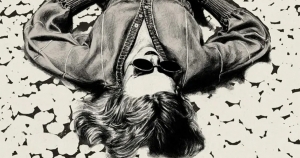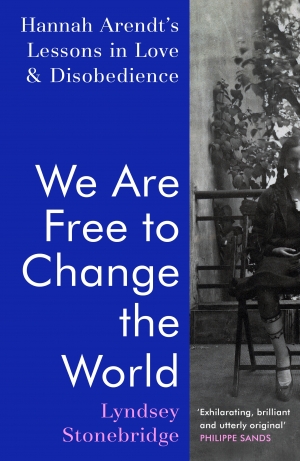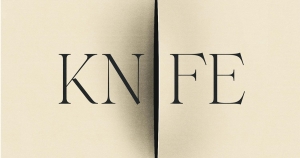Jonathan Cape
The recent discovery of Neanderthal remains in a cave in France is timely for Rachel Kushner’s latest novel, Creation Lake, which opens with the question: ‘What is a human being?’ Timely, because this novel deals with the question in a largely archaeological manner, focusing on that nebulous point in history when Neanderthals and Homo sapiens parted ways. The former, it seems, went quietly into extinction; the latter, with their cunning intellect and knack for not knowing what is good for them, went on to create the socio-environmental mess we find ourselves in today.
... (read more)Julienne van Loon reviews ‘We Are Free to Change the World: Hannah Arendt’s lessons in love and disobedience’ by Lyndsey Stonebridge
We Are Free to Change the World, an intellectual biography of Hannah Arendt, is Lesley Stonebridge’s seventh book, and is informed by the author’s expertise in twentieth-century literature, history, law, and political theory. Stonebridge is a Professor of Humanities and Human Rights at the University of Birmingham, and a regular contributor to the New Statesman. A successful scholar, she is also used to communicating to audiences beyond the academy.
... (read more)James Ley reviews ‘Knife: Meditations after an attempted murder’ by Salman Rushdie
The opening pages of Knife give an account of the attempted murder of Salman Rushdie at a speaking engagement in upstate New York on 12 August 2022. His assailant charged out of the audience and onto the stage, where he attacked the author, using one of several knives he had brought along, for exactly twenty-seven seconds. Rushdie is precise about that detail, which one imagines is rather a long time if you are being stabbed. By the time he was restrained, the would-be assassin had seriously wounded Rushdie’s left hand, punctured his torso multiple times, slashed his neck, and stabbed him in the right eye deeply enough to destroy the optic nerve.
... (read more)Diane Stubbings reviews 'The Wren, The Wren' by Anne Enright
In her essay ‘The Irish Woman Poet’, Eavan Boland (herself considered Ireland’s greatest female poet) noted that ‘The life of the Irish woman – the ordinary lived life – was both invisible and, when it became visible, was considered inappropriate as a theme for Irish poetry.’ The only place within poetry for an Irish woman, history seemed to insist, was as either muse or myth. Any hint of her as a flesh-and-blood creature was effectively erased.
... (read more)J.R. Burgmann reviews 'Prophet' by Helen MacDonald and Sin Blaché
For those familiar with Helen MacDonald’s popular nature memoir H is for Hawk (2014), her latest work will come as a surprise. Prophet is many things, most of which bear little resemblance to any of MacDonald’s previous work. To begin with, Prophet is a co-authored work of fiction, a rare feature in the world of novelists, in which co-authors are often compelled to conceal such paratextual detail, as in Daniel Abraham and Ty Franck’s The Expanse series, published under the pen name James S. A. Corey. Where other narrative arts enjoy the cachet of collaboration, literature – in particular literary fiction – prefers the toil of the sole creator. It is only right, then, that Prophet is a bona-fide page turner made of equal parts spy thriller, science fiction, and romance. Germinated in collaborative back and forth over Zoom at the height of the pandemic, friends MacDonald and Sin Blaché have produced an action novel that, while carrying the troubling traces of the time, leans into the comforting diet of cultural nostalgia millions embraced during the binge-filled days of lockdown.
... (read more)Laura Elizabeth Woollett reviews 'Lapvona' by Ottessa Moshfegh
‘Lapvona dirt is good dirt,’ say the inhabitants of the titular medieval fiefdom in which Ottessa Moshfegh’s fourth novel, Lapvona, takes place. While the description refers to Lapvona’s rich soil, it could easily be an artistic statement. Moshfegh has long been an author concerned with physical and existential waste, and a vector for protagonists who alternately wallow in and renounce their own muck – from the virginal twenty-four-year-old narrator of Eileen (2015), who abuses laxatives and can’t bear to contemplate her own genitals, to the acerbic sleeping beauty at the heart of her most renowned work, My Year of Rest and Relaxation (2018), to Vesta Gul of Death in Her Hands (2020), a hermetic widow obsessively investigating an imaginary murder. The post-plague abjection of Lapvona is therefore fertile ground for Moshfegh to explore the horrors of embodiment that have previously defined her work.
... (read more)Every time I open Ocean Vuong’s Time Is a Mother, that Sam & Dave lyric ‘Hold on, I’m comin’!’, pops into my head. Is it ars poetica? Hold on: language, arranged in a holding way, might help us manage loss, though no hold will forestall it. I’m coming: the radical presence of the poetic speaker, whose ecstatic ‘now’ of speech exists in strange tension with the past, a thing lost, that full and irretrievable ‘then’. Anne Carson has written memorably of the strange telescoping of now and then in lyric poetry. This is the dilemma of the poet–lover: ‘pinned in an impossible double bind, victim of novelty and recurrence at once.’ Or, as Vuong puts it, ‘[t]he way Lil Peep says I’ll be back in the mornin’ when you know how it ends.’
... (read more)Don Anderson reviews 'Mother’s Boy: A writer’s beginnings' by Howard Jacobson
A Writer’s Beginnings begins: ‘My mother died today.’ One could be excused for thinking that one was reading not a memoir but a Campus Novel without the ‘p’, an experience that Howard Jacobson will suffer later in this book. Who could read this incipit without hearing the famous beginning: ‘Aujourd’hui maman est morte. Ou peut-être hier, je ne sais pas.’ Jacobson, on the other hand, knows. He continues: ‘It is 3 May 2020. She is ninety-seven years old.’ I cannot recall whether Albert Camus specifies his protagonist’s mother’s age in L’Étranger (1942). A Camus novel is surely a Campus Novel without the ‘p’, the latter a sub-genre that Jacobson will both live out teaching English at a polytechnic in a defunct football stadium and come to write. Indeed, so insistent is his use of the locution ‘we’ll come to that later’ that one could be excused for thinking prolepsis a Finklerish (see below) rhetorical device. Give Howard Jacobson enough trope and he’ll surely hang himself.
... (read more)Patrick McCaughey reviews ‘A Life of Picasso: The minotaur years, 1933–1943’ by John Richardson
Sir John Richardson published the first volume of his monumental A Life of Picasso: The prodigy, 1881–1906, in 1991. The second volume, The painter of modern life, 1907–1917 illuminating the Cubist years, followed in 1996. The next volume, The triumphant years, 1917–1932, appeared eleven years later and gave rise to speculation as to how Richardson, then seventy-three, could complete his ambitious task with nearly thirty years of prodigious production on the artist’s part still to be covered. Now we have the fourth and final volume, The minotaur years, published posthumously – Richardson died in 2019 – with a lot of assistance. It’s the shortest, least compelling volume of the series.
... (read more)Tali Lavi reviews 'More Than I Love My Life' by David Grossman, translated by Jessica Cohen
Studying The Crucible in English class engendered fierce competition for the part of John Procter, drawn as we schoolgirls were to his irradiating idealism and dogged pursuit of truth, and besotted by his nobility. The play’s force remains even as the passage of time has worked upon subsequent rereadings. When resisting false allegations of witchcraft, Proctor’s plea is harrowing: ‘Because I am not worth the dust on the feet of them that hang! How may I live without my name? I have given you my soul; leave me my name!’
... (read more)









